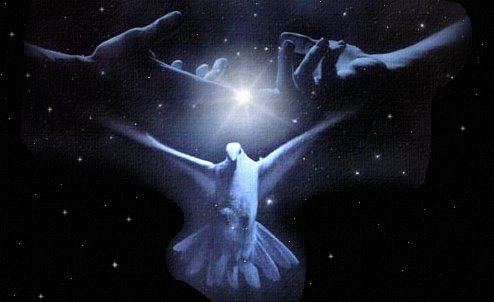|

Lazarus, Come Forth!

By the Rev. Lee Woofenden
Bridgewater,
Massachusetts, March 21, 1999
Readings

Psalm
68:19, 20 The Lord gives escape from death
Praise be to
the Lord, to God our Savior,
Who bears our burdens day by day.
Our God is a God who saves;
From the Lord God comes escape from death.

John
11:1-16, 38-45 Jesus raises Lazarus from death
Now a man
named Lazarus was sick. He was from Bethany, the village of Mary and her
sister Martha. This Mary, whose brother Lazarus now lay sick, was the
same one who poured perfume on the Lord and wiped his feet with her
hair. So the sisters sent word to Jesus, "Lord, the one you love is
sick."
When he
heard this, Jesus said, "This sickness will not end in death. No,
it is for God's glory so that God's Son may be glorified through
it." Jesus loved Martha and her sister and Lazarus. Yet when he
heard that Lazarus was sick, he stayed where he was two more days.
Then he
said to his disciples, "Let us go back to Judea."
"But
Rabbi," they said, "a short while ago the Jews tried to stone
you, and yet you are going back there?"
Jesus
answered, "Are there not twelve hours of daylight? A man who walks
by day will not stumble, for he sees by this world's light. It is when
he walks by night that he stumbles, for he has no light." After he
had said this, he went on to tell them, "Our friend Lazarus has
fallen asleep; but I am going there to wake him up."
His
disciples replied, "Lord, if he sleeps, he will get better."
Jesus had
been speaking of his death, but his disciples thought he meant natural
sleep. So then he told them plainly, "Lazarus is dead, and for your
sake I am glad I was not there, so that you may believe. But let us go
to him."
Then
Thomas (called Didymus) said to the rest of the disciples, "Let us
also go, that we may die with him."...
Jesus
came to the tomb. It was a cave with a stone laid across the entrance.
"Take away the stone," he said.
"But,
Lord," said Martha, the sister of the dead man, "by this time
there is a bad odor, for he has been there four days."
Then
Jesus said, "Did I not tell you that if you believed, you would see
the glory of God?"
So they
took away the stone. Then Jesus looked up and said, "Father, I
thank you that you have heard me. I know that you always hear me, but I
said this for the benefit of the people standing here, that they may
believe that you sent me."
When he
had said this, Jesus called in a loud voice, "Lazarus, come
forth!" The dead man came out, his hands and feet wrapped with
strips of linen, and a cloth around his face. Jesus said to them,
"Take off the grave clothes and let him go."
Therefore
many of the Jews who had come to visit Mary, and had seen what Jesus
did, put their faith in him.

Heaven
and Hell #445 Death and resurrection
When our
body can no longer perform its functions in the physical world,
expressing the thoughts and feelings of our spirit (which we have from
the spiritual world) we say that we die. This happens when our lungs
stop breathing and our heart stops beating.
Yet we do
not die, but are only separated from the body that had been useful to us
in the world. We ourselves continue to live. I say we ourselves continue
to live since we are not human because of our body, but because of our
spirit. It is the spirit within us that thinks--and thinking together
with feeling makes us human.
This
means that when we die, we only pass from one world to another. Because
of this, when "death" is mentioned in the Bible, its deeper
meaning is re-awakening and continued life.

Sermon
Jesus
called in a loud voice, "Lazarus, come forth!" The dead man
came out, his hands and feet wrapped with strips of linen, and a cloth
around his face. Jesus said to them, "Take off the grave clothes
and let him go." (John 11:43, 44)
I am sure
that I was meant to be a minister and not a weather forecaster. In this
month's Correspondent, I began my Pastor's Column by saying,
"Now that the snow has melted away . . ." only to have two
more snowstorms hit us in rapid succession!
Still,
this season is a time of resurrection. We've already been through the
coldest months, and the warm days are starting to come back. Last week I
was delighted to see the first crocuses coming up in our front borders
at home, assuring us that the spring that officially started yesterday
really is on its way. And the flowers of nature are perfect emblems of
the Lord's resurrection, which we celebrate at Easter time.
Our
reading today, which we also studied in Sunday School, gives us an
opportunity to prepare our minds and hearts for the events of Holy Week,
from Palm Sunday to Easter. And the first thing we realize as we read
the story of Lazarus is that before the Lord resurrected him, he
experienced death--just as the world of nature experiences the dormancy
of winter before the new resurrection of spring.
Of
course, when we read the story of Lazarus, we know the ending.
But for a moment, let's put ourselves in the shoes of Lazarus, and
consider how he experienced these events. When the realization hit
Lazarus that he was dying, he could not have known that he would be
brought back to life to continue living here on earth. He had to face
his own death with the same sense that we all face death: that this was
the end of his earthly life. Depending on his particular faith, he may
have felt that this was the end of his existence, or that he would
continue on in some form of afterlife. If he shared his sister's views,
he probably thought he would be raised up in a great resurrection at
some future last day.
But all
of these would have been speculations. The reality for him at that
moment was that he was dying. His old, familiar life was over. What
happened next, if anything, would be very different from what he had
ever experienced before. Perhaps it was with thoughts like these that he
breathed his last breath, and subsided into the sleep of death.
And in
fact, his life ever after that was entirely different--even if in
many ways it was the same. Lazarus could never have anticipated hearing,
or perhaps sensing, those powerful words, "Lazarus, come
forth!" and walking out of the grave to rejoin his family and
friends. And when he experienced that wonder, he could hardly help
becoming a different person. He knew that his life had a meaning far
deeper than he could have suspected. As we learn later on in the Gospel
story, the religious leaders of the day made plans to kill Lazarus just
as they planned to kill Jesus. And so he continued to live in the
balance between life and death.
Unlike
Lazarus, most of us experience physical death only once. But we can
experience death in our spirits many times. Of course, we experience
death whenever a loved one dies. But we also experience death whenever
we leave behind something that has been a part of us, and we experience
death whenever a particular phase of our life ends.
I still
remember my first bicycle. I got it for Christmas one year when I was
about six years old. It was shiny and red, with white trim. I loved that
bike! At first I needed training wheels to ride it, but in time the
training wheels came off, and after numerous scrapes and bruises, I was
proudly riding it up and down the road all by myself.
But a
time came when the bicycle seat just wouldn't go up any higher, and that
bike that had been so big when I first got it was seeming mighty
small to me. I hated to let it go, but I had to admit, it was time for
another bike. The bike that had been my pride and joy became a
hand-me-down for my younger brother, and I, in turn, received a bike
that had belonged to one of my older brothers. It was traumatic to leave
behind that not-quite-so-shiny bicycle, but it certainly did feel good
to have a bike that fit again!
We all
went through these childhood "deaths" of the old as we moved
on to the new. Sometimes we cried when a beloved toy was broken beyond
repair, and we realized we would never be able to play with it again.
The pain could linger on; but it was usually overcome with the passage
of time, as new toys and new interests took the place of the old.
It is
harder to get over are the emotional deaths that we have had to endure.
For me, one of the most difficult times in my childhood was when our
family moved away from the neighborhood in Missouri where I had good
friends, to a new place where I never quite regained the same sense of
belonging in the neighborhood. I remember sitting on the curb at the new
house with my sister, and both of us knew it would never be the same.
Yet life
goes on. I learned to find good things about the new town where we were
living. I was getting old enough to range farther abroad on my own, and
soon grew to appreciate the woods, streams, ponds, and lakes in the new
place. And I found my own small circle of friends that I could share
thoughts with and enjoy their company.
But even
deeper are the deaths we must face as we go through the changes that
come with our growth as a person. We may face the death of our youthful
idealism as we leave school and find that the practical realities of
life are dictating how we spend most of our time. We may face the death
of our independence as we settle down with a marriage partner and start
a family, learning what it means to be responsible to another person and
not just to ourselves. We may struggle with further loss of independence
as we grow older and are no longer able to fully take care of ourselves.
We may struggle against the death of old, ingrained habits as we realize
that they are hurting both ourselves and the people we love, and are
damaging our relationships. Each of us, if we look at our lives, can
find many deaths, on many levels, that we have had to go through--and
that we may be going through right now.
And yet,
both this season and the events of our Bible story assure us that these
emotional and spiritual deaths are not the end. Through these
experiences, a new and deeper life can come forth that we had never
known before. For all the struggles that come with family life, there
are also newer and deeper satisfactions with our marriage partner and
our children. And when we have struggled against a faulty attitude or
bad habit that has been hurting both ourselves and those around us, we
gain a new level of freedom within ourselves, and often a new level of
love and connection with the people around us.
We must
endure many deaths during our lifetime. But we have the comforting
assurance that death is not the end, but the beginning of new life and
new love. And so we can say with the Psalmist, "Praise be to the
Lord, to God our Savior, who bears our burdens day by day. Our God is a
God who saves; from the Lord God comes escape from death." Amen.
 

 

© Danny Hahlbohm
Painting entitled Trinity
Music:
Prism: Color of Love
©Bruce DeBoer


|